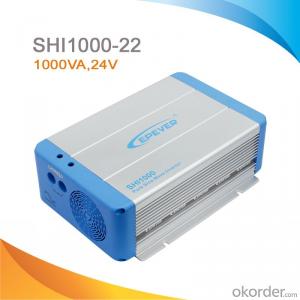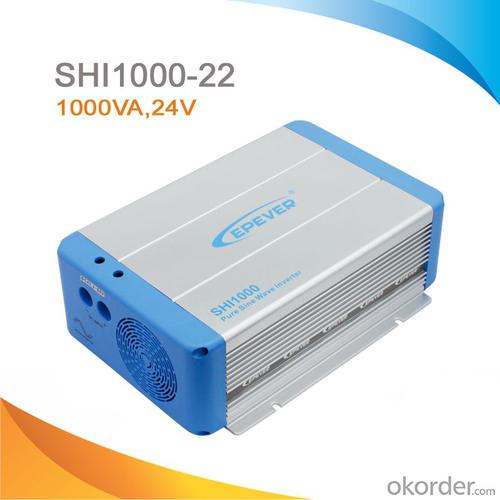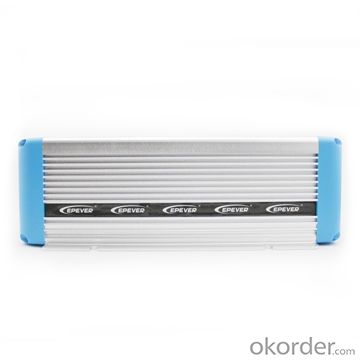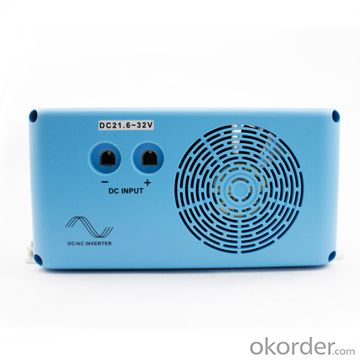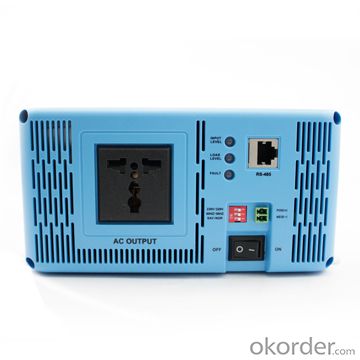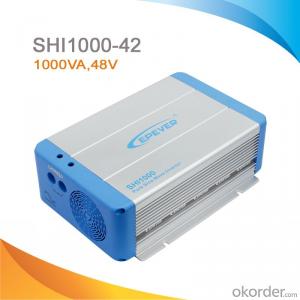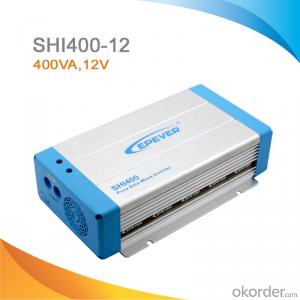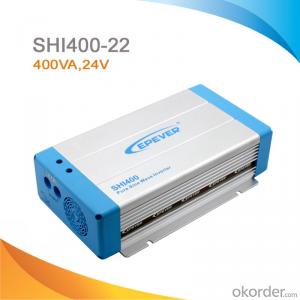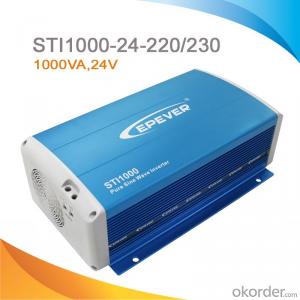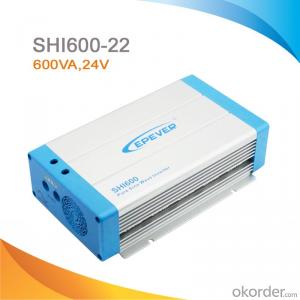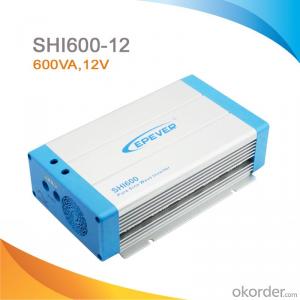Solar Inverter Set SHI 1000W High-Frequency Pure Sine Wave Inverter DC 24V to AC 220V/230V, SHI1000-22
- Loading Port:
- China Main Port
- Payment Terms:
- TT or LC
- Min Order Qty:
- -
- Supply Capability:
- -
OKorder Service Pledge
OKorder Financial Service
You Might Also Like
Description
SHI series is a pure sine wave inverter which can convert 12/24/48Vdc to 220/230Vac 50/60Hz based on full digital and intelligent design. It features high reliability, high efficiency, concise outline, small volume, easy installation and operation. The inverter can be applied in many fields, such as household appliances, electric tools and industrial devices etc, especially for solar photovoltaic power system.
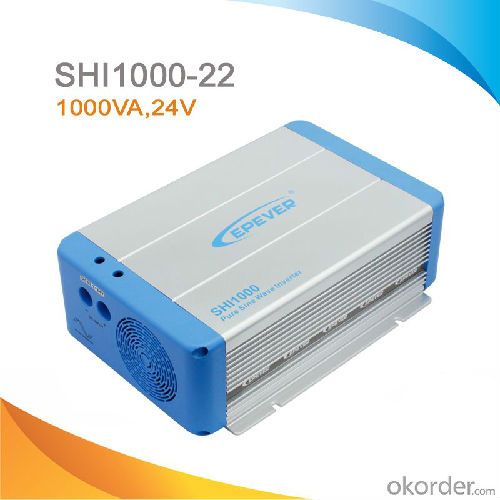
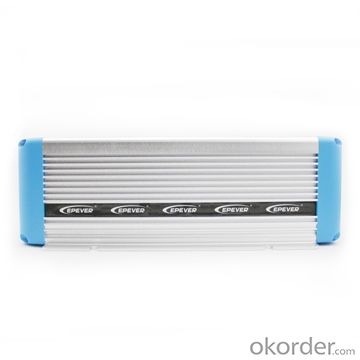
Features:
·Wide DC input voltage range
·The output voltage and frequency can be switched
·Low output harmonic distortion(THD≤3%)
·LED indicators for input voltage range, load power range, normal output & failure state
·Optional energy saving mode
·Wide working temperature range (industrial level)
·Continuous operation at full power
Protections:
·Output short circuit protection
·Overload protection
·Input low voltage protection
·Input over voltage protection
·Overheating protection
·Inverter abnormal protection
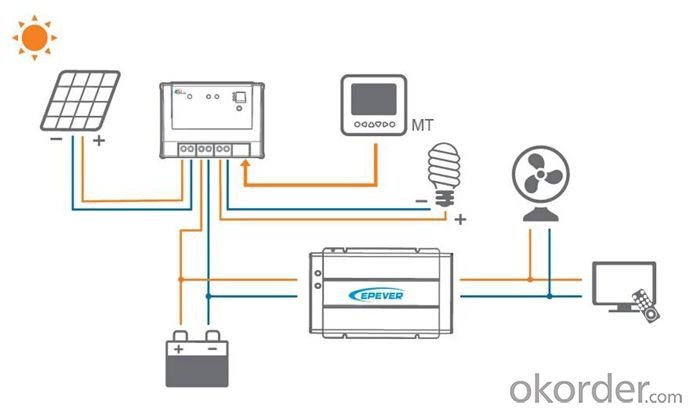
Specification:
Types | SHI1000-22 | SHI1000-42 |
Nominal Battery Voltage | 24V | 48V |
Input Voltage Range | 21.6~32Vdc | 43.2~64Vdc |
No Load Current | ≤0.45A | ≤0.35A |
Output Wave | Pure Sine Wave | |
Output Voltage | 220Vac±3% / 230Vac±10% | |
Continuous Power | 1000W | |
Power 10 sec | 1500W | |
Power 1.5 sec | 2000W | |
Surge Power | 2250W | |
Frequency | 50/60Hz±0.2% | |
Distortion THD | ≤ 3% (resistive load) | |
Efficiency at Rated Power | ≥93% | ≥93.5% |
Max. Efficiency | ≥94% | ≥94% |
Terminal | 25mm2 | |
Dimensions | 295×208×98mm | |
Installation | 150×200mm | |
Hole Size | Φ6mm | |
Net Weight | 3.3kg | |
Working Temperature | -20℃~ +50℃ | |
Storage Temperature | -35℃~ +70℃ | |
Humidity | < 95% (N.C.) | |
Altitude | < 5000m(Derating to operate according to IEC62040 at a height exceeding 1000m) | |
Insulation Resistance | Between DC input terminals and metal case: ≥550MΩ; Between AC output terminals and metal case: ≥550MΩ. | |
Dielectric Strength | Between DC input terminals and metal case: Test voltage AC1500V, 1 minute Between AC output terminals and metal case: Test voltage AC1500V, 1 minute | |
FAQ
Q1:Can we visit your factory?
A1:Sure,welcome at any time,seeing is believing.
Q2:Which payment terms can you accept?
A2:T/T,L/C,Moneygram,Paypal are available for us.
- Q: What are the potential risks of electrical shock from a solar inverter?
- The potential risks of electrical shock from a solar inverter include: 1. Improper installation or faulty wiring, which may result in exposed live wires and increase the chances of electric shock. 2. Inadequate grounding or lack of proper safety measures, leading to the possibility of electrical leakage and shock hazards. 3. Accidental contact with energized components during maintenance or repair work, especially if proper safety precautions are not followed. 4. Inverter malfunctions or defects, such as insulation breakdown, which can expose individuals to electric shock. 5. Working with solar inverters in wet or damp conditions, as moisture can increase the conductivity of electricity and heighten the risk of shock. 6. Ignoring warning signs or not following manufacturer guidelines for safe operation and maintenance, which can contribute to electrical shock incidents.
- Q: Can a solar inverter be used in systems with different module efficiencies?
- Yes, a solar inverter can be used in systems with different module efficiencies. Solar inverters are designed to convert the DC power generated by solar panels into AC power, regardless of the module efficiency. The inverter's main function is to optimize the power conversion process and ensure compatibility between the solar panels and the electrical grid. As a result, it can accommodate varying module efficiencies and still function efficiently.
- Q: Can a solar inverter be used with a ground-mounted solar array?
- Yes, a solar inverter can be used with a ground-mounted solar array. A solar inverter is responsible for converting the DC (direct current) electricity produced by the solar panels into AC (alternating current) electricity that can be used to power homes or businesses. Whether the solar array is ground-mounted or roof-mounted, the solar inverter plays a crucial role in converting the electricity for use in the desired location.
- Q: How does a solar inverter handle power factor correction?
- A solar inverter handles power factor correction by using advanced control algorithms and circuitry to actively manage and adjust the power factor of the electrical output. It does this by continuously monitoring the load and adjusting the phase angle and voltage to ensure that the power factor remains close to unity (1.0). This helps optimize the efficiency of the solar system and ensures that the power being generated is in sync with the grid requirements.
- Q: How does a solar inverter handle voltage drop in long cable runs?
- A solar inverter compensates for voltage drop in long cable runs by using a technology called Maximum Power Point Tracking (MPPT). MPPT allows the inverter to continuously adjust the operating voltage and current to extract the maximum power from the solar panels. This ensures that even with voltage drop in long cable runs, the inverter optimizes the power output from the panels, ultimately minimizing the impact of the voltage drop.
- Q: How does a solar inverter handle shading on the solar panels?
- A solar inverter handles shading on the solar panels by utilizing maximum power point tracking (MPPT) technology. This technology enables the inverter to constantly monitor the output of each individual solar panel and adjust the voltage and current to ensure maximum power generation. When shading occurs on a panel, the inverter adjusts the voltage and current to bypass the shaded area and optimize the output from the unshaded areas. This allows the system to still generate as much power as possible, despite the shading.
- Q: What is the role of a solar inverter in optimizing energy production?
- The role of a solar inverter in optimizing energy production is to convert the direct current (DC) electricity generated by solar panels into alternating current (AC) electricity that can be used to power homes and businesses. In addition to this basic function, a solar inverter also plays a crucial role in maximizing energy production by efficiently managing the flow of electricity, ensuring that the solar system is operating at its highest capacity, and adapting to changes in sunlight intensity to achieve optimal energy output.
- Q: Can a solar inverter be connected to a generator?
- Yes, a solar inverter can be connected to a generator. This allows the solar energy system to work in conjunction with the generator, providing additional power when the solar energy is insufficient or unavailable. The generator serves as a backup power source, ensuring a continuous supply of electricity.
- Q: What is the role of a solar inverter in a battery storage system?
- The role of a solar inverter in a battery storage system is to convert the direct current (DC) electricity generated by solar panels into alternating current (AC) electricity that can be used to power homes or businesses. It also manages the charging and discharging of the batteries, ensuring efficient storage of excess energy generated by the solar panels and providing a reliable power supply during periods of low solar generation or power outages.
- Q: Can a solar inverter be used for both residential and commercial applications?
- Yes, a solar inverter can be used for both residential and commercial applications. Solar inverters are designed to convert the direct current (DC) electricity generated by solar panels into alternating current (AC) electricity, which is suitable for use in homes and businesses. They are versatile and can be scaled up or down depending on the size of the solar power system, making them suitable for both residential and commercial installations.
Send your message to us
Solar Inverter Set SHI 1000W High-Frequency Pure Sine Wave Inverter DC 24V to AC 220V/230V, SHI1000-22
- Loading Port:
- China Main Port
- Payment Terms:
- TT or LC
- Min Order Qty:
- -
- Supply Capability:
- -
OKorder Service Pledge
OKorder Financial Service
Similar products
Hot products
Hot Searches
Related keywords
